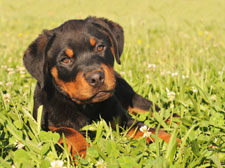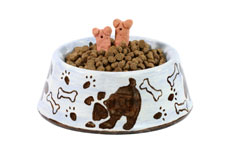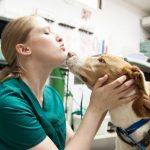Taking care of your puppy takes a lot of time, effort, patience and money.
In This Article You Will Read About
Your baby Rottweiler has the potential to grow into a wonderful dog, but right now he’s just a little pup who needs you to look after him!
Puppies are just like babies and they depend on you for food, shelter, love and protection.
Although a puppy is a lot of work, and is definitely a big commitment, it’s also lots of fun and very rewarding!
That little furball in your arms will be an adult in no time, so make the most of these ‘puppy days’ and start off the right way by learning how to keep your little guy (or girl) happy and healthy.
If you’re still at the ‘thinking and planning’ stage of adding a Rottweiler puppy to your family, I’d really recommend checking out my Choosing A Rottweiler Breeder page as it has tons of tips and advice to help you.
Also, check out my NEW Rottweiler Breeders Directory for information on some of the best, most reputable Rottie breeders around.
If you’re a new puppy owner you might be wondering exactly what you’ve got yourself into right about now…. but don’t worry, you’ll find everything you need to know about raising your Rottweiler puppy right here.
How To Raise A Happy, Healthy Puppy

Taking care of a puppy, won’t be overwhelming, or worrying, if you know the basics.
If you’ve raised children you’ll have a vague idea of what’s in store, if not, you may want to consider this your preparation for becoming a parent!
Your baby Rottweiler has some very basic needs, these include :
- Top quality nutrition
- Proper health care
- Obedience Training & housebreaking
- Regular exercise
- Early and ongoing socialization
- Shelter & companionship
- Lots of love!
To fulfill these puppy care needs, YOU are going to need to invest a fair amount of time and effort, tap into your resources of patience, and dip into your wallet. If you don’t have the necessary resources, you may want to reconsider whether you’re ready to become a puppy parent at this point in your life.
It’s a sad fact that many pups find themselves abandoned or turned over to rescue centers or pounds because their owners didn’t realize that they had needs. Puppies are not cuddly toys who sit quietly waiting for you to find time for them!
They need to be supervised at all times, fed at least 3 times a day, taken outside to ‘potty’ every hour, exercised, played with …. and much more, so be prepared.
Feeding Rottweiler Puppies

One of the first things you need to consider when taking care of a puppy is what you’re going to feed him.
Rottweilers are a large breed and physically Rottie pups grow very quickly, although they mature quite slowly.
Their rapid growth puts considerable strain on their bones/joints and ligaments, and they need optimum nutrition in order for their musculoskeletal system to develop properly.
Large breed puppies need a puppy food that is high in nutritional value, but not high in calories. A food that is too calorie-dense will promote the rapid growth which leads to health issues.
There are some excellent foods on the market today, but stay away from generic store-brand foods and do plenty of research before deciding what to feed your pup. I’ve put together lots of information on picking the best puppy food, and you can find information on some of the best adult dog foods on the market in this article 10 Best Dog Food Choices.
To give you just that little bit of extra help, you can find out how much to feed and how often, plus tons more useful tips and advice on my Feeding Puppies page.
And if you want to know if your pup is ‘on track’ in terms of his growth and development, or you’d like to get an idea of how much he’s going to weigh as an adult, check out my Rottweiler Puppy Growth Chart
Rotties are also a breed that tends to be susceptible to canine allergies. A food that contains a lot of additives, chemicals, fillers and so on will not only cause growth and development problems but may trigger allergies.
Potty Training Your Puppy
One of the major challenges new puppy owners face when taking care of a puppy is the housebreaking issue.
Puppies aren’t born knowing that they need to eliminate outdoors. In fact, as far as they’re concerned anywhere (with the exception of where they sleep) is fair game!
Teaching your baby Rottweiler that he needs to pee and poop outdoors ONLY, is something that has to be a priority on your ‘Taking Care Of A Puppy To Do List’.
Although housebreaking a puppy can be a challenge, using a crate can make the whole process much quicker and easier. Crate training puppies is a very effective method of potty training because it works WITH the pups natural instincts not to mess where it sleeps. Visit my Puppy Crate Training page for all the tips and advice you need.
The keys to successful housebreaking are patience and consistency. Puppies are very much creatures of habit, and it’s much easier to teach them the correct habit in the first place than it is to have to break a ‘bad habit’ and re-train them at a later date.
Making sure that your Rottweiler puppy doesn’t get a chance to have ‘accidents’ indoors, learns to control his bladder/bowels, and becomes familiar with an appropriate ‘potty spot’ are all very important from Day One!
Keeping Your Rottie Pup Healthy

Taking care of a puppy means that his health and wellness is totally your responsibility.
Luckily, there are some very simple, but effective ways of keeping your little guy safe and happy.
One of the most important of these is to make sure that he gets his puppy vaccinations on time.
Puppies are very susceptible to several serious, contagious dog illnesses, and the only way to protect them is through a regular vaccination program.
Usually, puppies get their first set of shots at around 7 weeks of age, and then two more sets, given at three-week intervals. These vaccinations protect against Distemper, Hepatitis, Leptospirosis, Parainfluenza, and Parvovirus.
There are other ‘optional’ vaccines that may be given, depending on where you live, and then the Rabies shot is mandatory in the US and is usually given when your pup is somewhere around 16 weeks old.
Other important parts of puppy health care include preventing and treating canine parasites including canine worms, fleas and ticks, mites and more. Then there’s grooming, diet and on-going preventative veterinary care.
Unfortunately, no matter how careful you are in taking care of a puppy, accidents and illness can (and do) happen!
If your pup was to become seriously ill, or be injured, would you have the finances to cover his veterinary bills? Even if they were $3000, $4000 or more? If you don’t, or you’d rather spend your savings on a vacation or new car, I’d strongly recommend getting some dog healthcare insurance for your Rottweiler.
Take a look at my Health Insurance For Your Dog page to learn how pet insurance could be a lifesaver for you and your pup.
Training, Socialization & Love
The three areas above are really important aspects of taking care of a puppy, but there’s so much more to this adventure!
Your baby Rottweiler is like the proverbial ‘blank slate’, he’s just waiting for you to teach him everything he needs to know.
BUT REMEMBER….. Rottweilers are very intelligent dogs, and if you don’t show him what’s acceptable, and help him to learn right from wrong, chances are he’ll make up the rules for himself – and you won’t appreciate them.
You can begin to teach your pup to recognize and respond to his name and some basic obedience commands such as ‘Sit’ and ‘Stay’ as soon as you bring him home. He’ll be very anxious to please you and will learn quickly. Check out my FREE puppy training tips for lots of help with training your pup.
Rotties are loving dogs and thrive in a family setting, but they are naturally reserved with strangers. This inherent ‘aloofness’ combined with their guardian heritage, makes it hugely important that they’re socialized well throughout their lifetime.
Socialization is the process of introducing a pup to a whole range of different people, things, places, sounds, smells, sights and so on. A dog who is raised in a ‘closed’ or limited environment and who only ever sees the same people can easily become nervous and scared when he’s outside of his comfort zone.
In a big, strong dog like a Rottweiler, this can make him difficult to handle when he’s around other dogs, pets or people, or just generally ‘out and about’. It can eventually lead to anxious, fearful behavior or even fear-based aggression.
Luckily it’s pretty easy to make sure this never becomes a problem by taking your pup to a whole lot of different places and introducing him to a variety of different people. You should continue to do this his whole life.

You can help the ‘bonding’ process between you and your baby Rottweiler by spending time playing with him, teaching him and just cuddling with him. Rotties have a tendency to think that they’re lap dogs (even when they weigh 120lbs, so your little guy needs your attention).
These dogs are very sensitive and loving, so never use harsh words or punishments if your pup does something wrong.
Only use positive encouraging training techniques, and shower him with praise, love (and a few tasty treats won’t go wrong!) when he’s successful at anything.

